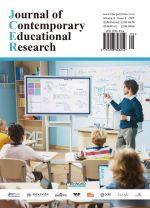Enhancing International Communication Effectiveness: The Impact of ESAP on the Output of Academic Paper Abstracts
Abstract
English for Specific Academic Purposes (ESAP) focuses on English language skills in specific disciplines or research fields, and has played an important role in international communication in recent years. This paper aims to explore the relationship between ESAP, the output of academic paper abstracts, and international communication effectiveness, so as to provide new ideas for enhancing international communication effectiveness. Through a questionnaire survey and combined with the structural equation model analysis method, the results show that the improvement of ESAP has a positive effect on the output of academic paper abstracts and international communication effectiveness; the output of academic paper abstracts can also positively enhance international communication effectiveness; meanwhile, the output of academic paper abstracts has a significant mediating effect.
References
Cai J, 2020, Publication of Journal Papers and Cultivation of Graduate Students’ Academic Literacy and Professional Literacy. Academic Degrees & Graduate Education, 2020(7): 40–44.
Wang L, Li J, 2023, Design and Implementation of Undergraduate Training Programs for International Language Services. Frontiers of Foreign Language Education Research, 6(2): 44–51 + 94.
Cai J, 2021, Practice of English for Specific Academic Purposes (ESAP) Teaching: The 5-Minute English Academic Speech Contest for Chinese College Students. Frontiers of Foreign Language Education Research, 2021(3): 43–48.
Wang L, Li J, 2022, Proactively Serving High-Quality Development and Accelerating the Construction of “New Liberal Arts Linguistics” With Chinese Characteristics. Journal of Beijing International Studies University, 2022(1): 3–10.
Hutchinson T, Waters A, 1987, English for Specific Purposes. Cambridge: Cambridge University Press.
Swales J, 1990, Genre Analysis: English in Academic and Research Settings. Cambridge: Cambridge University Press.
Cai J, 2023, Design Considerations for the Chinese Academic English Proficiency Scale: Classification and Grading. Foreign Language Teaching Theory and Practice, 2023(2): 62–69.
Zhang Y, Niu W, 2016, An Analysis of Non-English Major Graduate Students’ Ability to Write English Abstracts for Graduation Theses. Modern Communication, 2016(20): 130–131.
Chen X, Du G, 2019, Evaluation and Discussion on the Quality of English Abstracts in Graduate Dissertations. Journal of Heilongjiang College of Education, 2019(2): 136–138.
Yao X, 2010, The Impact of Process-Genre Approach and Product Approach on Students’ Writing Application Strategies and Writing Ability. Foreign Languages and Their Teaching, 2010(3): 30–34.
Ju Y, 2004, Genre Analysis and English-Chinese Academic Paper Abstract Discourses. Foreign Language Teaching, 2004(2): 32–37.
Liu Y, Gong Z, 2023, Types and Logic of Research Questions: A Comparative Study Based on English Academic Papers by Academic Novices and Experts. Foreign Language World, 2023(5): 31–39.
Hu Y, Zhao Z, 2023, A Meta-Analysis of the Effectiveness of International Communication Under the “Belt and Road Initiative” (2013–2022). Contemporary Communications, 2023(6): 33–38.
Zhou Q, 2023, Understanding the Proposition of International Communication Effectiveness in a Multi-Contextual Environment. Xinhua Digest, 2023(9): 150–151.

